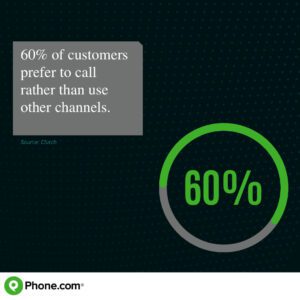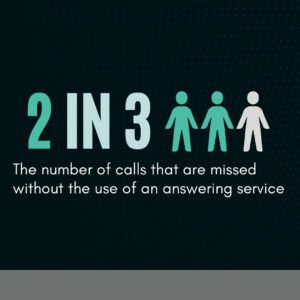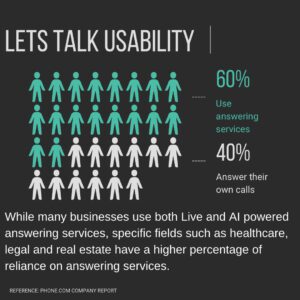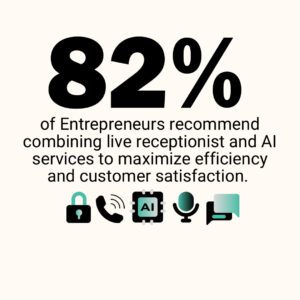In the realm of business communications, the telephone remains an indispensable tool for connecting with customers, clients, and partners. However, the methods by which businesses manage their incoming calls have evolved significantly over the years, reflecting technological advancements and shifting workplace dynamics. From the days of traditional answering services staffed by human operators to the dawn of virtual work and artificial intelligence (AI), the landscape of phone answering services has undergone a profound transformation.
Historical Evolution
The concept of answering services traces back to the mid-20th century when businesses relied on live operators to field incoming calls outside of regular business hours. These operators, often working in centralized call centers, played a crucial role in ensuring that businesses remained accessible to their clientele at all times. As technology progressed, the introduction of voicemail systems provided an alternative for capturing messages during non-operational hours, albeit with limited interactivity compared to live operators.

Virtual Work and AI Revolution
Fast forward to the present day, and the proliferation of virtual work arrangements and AI-driven solutions has ushered in a new era for phone answering services. With advancements in telecommunications and internet connectivity, businesses now have a myriad of options for managing their incoming calls remotely. Virtual receptionists, equipped with sophisticated AI algorithms, can handle a wide range of inquiries with efficiency and professionalism, blurring the lines between human and machine interaction.
Moreover, the rise of AI-powered chatbots and voice assistants has expanded the possibilities for automated customer service, allowing businesses to provide round-the-clock support without the need for human intervention. These intelligent systems leverage natural language processing and machine learning algorithms to understand and respond to customer queries in real-time, enhancing the overall efficiency and scalability of phone answering services.
Looking Ahead
As time marches on the landscape of business phone answering continues to evolve at a rapid pace. With ongoing advancements in AI, automation, and virtual collaboration technologies, businesses are presented with unprecedented opportunities to streamline their communications processes and deliver exceptional customer experiences. However, amidst the excitement of innovation, it is essential for organizations to strike a balance between technological efficiency and the human touch, ensuring that they remain responsive to the diverse needs and preferences of their clientele.
Why On-Staff Receptionists Don’t Work for Most Small Businesses
 Small businesses often seek alternatives to employing a receptionist for several reasons:
Small businesses often seek alternatives to employing a receptionist for several reasons:
Cost-effectiveness: Hiring a full-time receptionist can be expensive for small businesses, especially when considering salary, benefits, and overhead costs. Seeking alternative solutions, such as virtual receptionists or AI-powered systems, can offer comparable services at a fraction of the cost.
Flexibility: Traditional receptionists typically work fixed hours, which may not align with the needs of small businesses that operate outside of standard business hours or experience fluctuating call volumes. Virtual receptionist services and automated systems provide greater flexibility, offering 24/7 availability and scalability to accommodate varying call volumes.
Efficiency: Virtual receptionists and AI-powered solutions can handle calls more efficiently than human operators in many cases. They can quickly route calls to the appropriate department or individual, provide basic information or assistance, and even schedule appointments or take orders, freeing up valuable time for small business owners and employees to focus on core tasks.
Scalability: As small businesses grow, their communication needs may evolve. Virtual receptionist services and AI-powered systems offer scalability, allowing businesses to adjust their phone answering capabilities without the need to hire additional staff or invest in infrastructure upgrades.
Consistency: Human receptionists may vary in their ability to handle calls effectively, depending on factors such as training, experience, and workload. Virtual receptionists and AI-powered systems provide a consistent level of service, ensuring that every caller receives prompt and professional assistance regardless of the time of day or specific circumstances.
Remote Work: The trend towards remote work has accelerated in recent years, driven by advancements in technology and changing workplace dynamics. Virtual receptionist services and AI-powered systems enable small businesses to leverage remote work capabilities, allowing employees to work from anywhere while maintaining seamless communication with customers and clients.
For Small Businesses – Every Call Matters
 Ensuring that every call is answered is crucial for small businesses for several reasons:
Ensuring that every call is answered is crucial for small businesses for several reasons:
Customer Satisfaction
Every missed call represents a missed opportunity to engage with a potential or existing customer. By answering every call promptly and professionally, small businesses can demonstrate their commitment to customer service and build positive relationships with their clientele.
Sales and Revenue Generation
Incoming calls often represent potential sales leads or opportunities for upselling products or services. By answering every call, small businesses can capture these opportunities and maximize their sales potential, ultimately contributing to revenue growth.
Brand Reputation
A missed call can leave a negative impression on callers, signaling to them that the business is unresponsive or unprofessional. On the other hand, consistently answering calls reinforces the perception of reliability, professionalism, and accessibility, enhancing the brand’s reputation in the eyes of customers and prospects.
Competitive Advantage
In today’s competitive business landscape, responsiveness can be a key differentiator that sets small businesses apart from their competitors. By ensuring that every call is answered promptly and efficiently, small businesses can gain a competitive edge and position themselves as preferred choices among consumers.
Customer Retention
Effective communication plays a vital role in customer retention. By promptly addressing customer inquiries, concerns, or requests, small businesses can foster loyalty and retain customers over the long term, reducing churn rates and maximizing customer lifetime value. Investing in professional call handling can significantly boost customer satisfaction and increase business efficiency
Missed Opportunities
Every missed call represents a potential missed opportunity, whether it’s a sales lead, a customer inquiry, or a partnership opportunity. Small businesses cannot afford to overlook these opportunities, as they could have a significant impact on the business’s growth and success.
Answering every call is essential for small businesses to maintain customer satisfaction, drive sales and revenue, enhance brand reputation, gain a competitive advantage, retain customers, and capitalize on missed opportunities. By prioritizing responsiveness and accessibility, small businesses can lay a strong foundation for success and growth in today’s dynamic business environment.
Fortunately, there are great options that don’t involve hiring a team of employees to work the phone lines.
Professional Live Answering Services: White Glove Customer Care
Professional virtual live receptionist services offer small and medium-sized businesses a solution to manage incoming calls effectively without the need for an on-site receptionist. These services typically involve a team of trained professionals who handle incoming calls on behalf of the business, providing personalized and professional assistance to callers.
Benefits of professional virtual live-receptionist services:
While professional live answering services are more expensive than AI-powered solutions, or traditional automated attendants, they offer a number of compelling advantages for small business owners. By using a live answering service, businesses can reduce missed calls, improve customer service, and enhance overall communication with clients
Professionalism: Virtual receptionists are trained to handle calls with professionalism and courtesy, ensuring that callers receive a positive impression of the business.
Cost-effectiveness: Hiring a virtual receptionist service is often more cost-effective than employing a full-time receptionist, as businesses only pay for the services they use rather than bearing the cost of salary, benefits, and overhead.
24/7 Availability: Virtual receptionist services can provide round-the-clock coverage, ensuring that businesses never miss important calls, even outside of regular business hours.
Scalability: Virtual receptionist services can scale to accommodate fluctuating call volumes, ensuring that businesses always have the capacity to handle incoming calls effectively.
Flexibility: Businesses can customize the services provided by virtual receptionists to suit their specific needs, whether it’s call screening, appointment scheduling, or order processing.
Virtual Live Receptionist services allow you to choose from customizable plans to suit your business needs, with highly trained receptionists who offer scalable services and multilingual support. You can significantly reduce missed calls with a live answering service while simultaneously boosting customer satisfaction and enhancing business communication.
How professional virtual live-receptionist services work
 Every live answering service you consider will have different features and work-flow processes, but generally, they follow the same experience for callers.
Every live answering service you consider will have different features and work-flow processes, but generally, they follow the same experience for callers.
Call Handling: Incoming calls to the business are routed to the virtual receptionist service provider’s call center. Virtual receptionists answer calls using the business’s custom greeting and handle them according to pre-defined protocols or scripts.
Call Screening: Virtual receptionists can screen calls to determine their urgency and importance, forwarding important calls to the appropriate person or department within the business. They can also weed out robocalls and SPAM.
Message Taking: Virtual receptionists can take messages from callers and relay them to the appropriate person within the business via email, text message, or voicemail.
Appointment Scheduling: Virtual receptionists can schedule appointments and manage calendars on behalf of the business, ensuring that appointments are booked efficiently and accurately.
Customer Service: Virtual receptionists can provide basic customer service assistance to callers, such as answering frequently asked questions or providing information about products and services.
Mitigating downsides of professional virtual live-receptionist services
While a virtual live answering service offers numerous benefits, it is not exactly the same has having an employee sitting at your worksite answering calls. Fortunately, there are some simple steps you can make to ensure an excellent caller experience.
Clear Communication: Business owners should communicate clearly with the virtual receptionist service provider about their specific needs and expectations to ensure that calls are handled appropriately.
Training: Virtual receptionists time to familiarize themselves with the business’s products, services, and procedures to provide accurate and effective assistance to callers. It usually takes up to 48 hours before new scripts, or script changes are implemented.
Monitoring and Feedback: Businesses should regularly monitor the performance of the virtual receptionist service provider and provide feedback to ensure that service levels meet their expectations.
Integration: Virtual receptionist services should be seamlessly integrated with the business’s existing communication systems to ensure a smooth and efficient call-handling process.
Live Answering Services Use Cases
Many types of businesses benefit from live answering services. Customers range from single owner/operator outfits to mult-national corporations. Here are some of the most common use cases.
Small Businesses with Limited Staff: Small businesses with limited staff, especially those without a dedicated receptionist, can benefit greatly from virtual receptionist services. Many businesses turn to outsourced receptionist services to manage their call handling needs, ensuring professional and reliable customer interaction without the overhead of in-house staff. These services ensure that all incoming calls are answered professionally and promptly, providing a positive impression of the business to callers. Virtual receptionists can handle tasks such as call screening, message taking, appointment scheduling, and basic customer service, allowing small business owners and employees to focus on core tasks without being interrupted by phone calls.
Professional Service Providers: Professionals such as lawyers, doctors, consultants, and freelancers often juggle multiple responsibilities and may not have the capacity to answer calls during client meetings or while working on projects. Answering services specifically for healthcare providers, real estate professionals, and legal firms requires specialized knowledge and sensitivity to industry-specific needs. Virtual receptionist services can serve as an extension of their practice or business, handling calls on their behalf and ensuring that clients receive timely assistance and information. Virtual receptionists can schedule appointments, screen calls, take messages, and provide basic information about services offered, enhancing the professionalism and efficiency of the service provider’s practice.
Businesses with Fluctuating Call Volumes: Businesses that experience fluctuating call volumes throughout the day or week can benefit from virtual receptionist services to ensure consistent and efficient call handling. Virtual receptionists can scale their services to accommodate peak call times, ensuring that callers never encounter busy signals or long wait times. During periods of high call volume, virtual receptionists can handle overflow calls, freeing up in-house staff to focus on other tasks. Conversely, during quieter periods, businesses can scale back the virtual receptionist services to optimize costs while still ensuring that calls are handled professionally.
AI-powered Answering Services: Efficiency and Cost Savings
 For small businesses on a budget, finding an affordable answering service that still delivers high-quality service is essential. AI-powered answering services leverage artificial intelligence technologies, such as natural language processing (NLP) and machine learning, to handle incoming calls and interact with callers in a human-like manner. These services can perform various tasks traditionally carried out by human receptionists, such as call routing, message taking, appointment scheduling, and providing basic information to callers.
For small businesses on a budget, finding an affordable answering service that still delivers high-quality service is essential. AI-powered answering services leverage artificial intelligence technologies, such as natural language processing (NLP) and machine learning, to handle incoming calls and interact with callers in a human-like manner. These services can perform various tasks traditionally carried out by human receptionists, such as call routing, message taking, appointment scheduling, and providing basic information to callers.
Benefits of AI-powered answering services
AI answering services help businesses get the most value out of every call even when employees are not available. The most important advantages include:
Cost-effectiveness: AI-powered answering services can be more cost-effective than employing human receptionists, as they can handle a high volume of calls simultaneously without the need for additional staff.
24/7 Availability: AI-powered services can provide round-the-clock availability, ensuring that businesses never miss important calls, even outside of regular business hours.
Scalability: AI-powered services can scale to accommodate fluctuating call volumes, ensuring that businesses always have the capacity to handle incoming calls effectively, regardless of the time of day or specific circumstances.
Efficiency: AI-powered services can handle calls quickly and efficiently, reducing wait times for callers and improving overall customer satisfaction.
Consistency: AI-powered services provide a consistent level of service, ensuring that every caller receives prompt and professional assistance regardless of the time of day or specific circumstances.
How AI-powered answering services work
Every solution you consider will have its own underlying technology and set-up requirements. Generally you can expect your AI answering solution to address:
Call Handling: Incoming calls to the business are routed to the AI-powered answering service’s system. The system uses NLP algorithms to understand the caller’s intent and respond accordingly.
Call Routing: The AI-powered system can route calls to the appropriate department or individual within the business based on predefined criteria or the caller’s request.
Message Taking: The system can take messages from callers and relay them to the appropriate person within the business via email, text message, or voicemail.
Appointment Scheduling: The system can schedule appointments and manage calendars on behalf of the business, ensuring that appointments are booked efficiently and accurately.
Customer Service: The system can provide basic customer service assistance to callers, such as answering frequently asked questions or providing information about products and services.
Minimizing the downsides of AI-powered answering services
There is unquestionably a tradeoff between the human touch of a live answering service and the efficiency and cost effectiveness of AI technology. If you choose to leverage AI, you can minimize the downsides with the following measures:
Training: AI-powered systems require training to ensure that they understand and respond to callers’ inquiries accurately and effectively.
Human Oversight: While AI-powered systems can handle many tasks autonomously, they may still require human oversight to handle complex or sensitive inquiries and ensure that the system operates smoothly.
Integration: AI-powered answering services should be seamlessly integrated with the business’s existing communication systems to ensure a smooth and efficient call-handling process.
AI answering service use cases
Three most common use cases for AI-powered answering services:
Customer Support: AI-powered answering services can handle customer inquiries, provide product information, and assist with common troubleshooting issues.
Appointment Scheduling: AI-powered services can schedule appointments, confirm reservations, and manage calendars on behalf of businesses in various industries, such as healthcare, beauty, and professional services.
Lead Generation: AI-powered services can qualify leads, gather contact information, and schedule follow-up appointments or meetings with sales representatives.
How to choose between a live answering service and AI-technology enable answering?

Choosing between a live receptionist service and AI answering technology depends on various factors, including the specific needs and preferences of the small business. Here’s a guide to help small business owners make an informed decision:
Evaluate Call Volume and Hours of Operation
Consider the volume of incoming calls your business receives and whether you need coverage during specific hours or around the clock. If your business receives a high volume of calls or operates outside of regular business hours, AI answering technology may be more suitable due to its scalability and 24/7 availability.
Assess Complexity of Call Handling
Determine the complexity of the calls your business receives and whether they require human interaction and problem-solving skills. If your business deals with complex inquiries that may benefit from human judgment and empathy, a live receptionist service may be preferable for providing personalized assistance to callers.
Consider Cost and Budget
Compare the cost of hiring a live receptionist service versus implementing AI answering technology, taking into account factors such as salary, benefits, training, and ongoing maintenance. For small businesses with limited budgets or fluctuating call volumes, AI answering technology may offer a more cost-effective solution, as it typically involves fixed monthly fees without additional overhead costs.
Analyze Customer Expectations
Consider the expectations and preferences of your customer base regarding communication channels and responsiveness. If your customers value human interaction and personalized service, a live receptionist service may be the preferred option to maintain a high level of customer satisfaction and retention.
 Evaluate Integration and Customization Options
Evaluate Integration and Customization Options
Assess the integration capabilities of both live receptionist services and AI answering technology with your existing communication systems and workflows. Choose a solution that seamlessly integrates with your business processes and allows for customization to meet your specific needs and branding requirements.
Plan for Growth and Scalability
Consider the scalability of the chosen solution to accommodate the growth of your business and evolving communication needs. Evaluate whether the selected option can easily scale to handle increased call volumes, expansion into new markets, or changes in business hours without significant disruptions.
Ultimately, the decision between a live receptionist service and AI answering technology should align with the unique requirements and priorities of your small business, balancing factors such as cost, functionality, customer experience, and scalability. It may also be beneficial to explore hybrid solutions that combine the strengths of both approaches to maximize efficiency and effectiveness in handling incoming calls.
Business Answering Services FAQs
What is the availability of AI and Live Answering services?
Phone.com offers 24/7 availability for AI and Live Answering services. This includes weekends and holidays. However, each service is different so, be sure to ask your provider about coverage.
How quickly is the AI and Live Answer service activated?
Often providers offering AI answering services can have it activated right away. Whereas Live Answer agents typically begin answering calls for your business 24-48 hours after you complete your intake interview.
Who is answering my Live Answering service calls?
Providers vet agents to ensure you have a highly qualified team of agents answering your calls. Therefore, you can ensure these agents have been selected for their professionalism and trained to deliver the highest customer service expertise.
Do providers offering answering services need to specialize in particular types of businesses?
Ideally, providers are training their agents to take calls for all types of companies in various fields, such as legal, medical, and real estate.
Are AI and Live answering services HIPAA compliant?
While many providers offer HIPAA compliance with their service you should confirm this with your provider.
Does the AI and Live Answering service integrate with my calendar?
Calendar integration can differ amongst providers but Phone.com’s answering services currently offer Google and Outlook calendar integration for appointment-making.
Conclusion
The evolving landscape of call handling solutions offers small businesses a wealth of options to enhance their communication strategies and meet the diverse needs of their clientele. Both virtual answering and AI-powered answering services present compelling benefits that can significantly impact a small business’s efficiency, professionalism, and customer satisfaction.
Virtual answering services provide the human touch and personalized interaction that many customers value, allowing businesses to maintain a professional image and build strong relationships with callers. With trained professionals managing calls remotely, small businesses can enjoy cost-effective solutions that offer flexibility, scalability, and round-the-clock availability.
On the other hand, AI-powered answering services leverage advanced technologies to streamline call handling processes, offering efficiency, scalability, and cost-effectiveness. These services enable small businesses to manage high call volumes, provide 24/7 support, and optimize resources, all while delivering prompt and accurate assistance to callers.
Ultimately, the choice between virtual and AI-powered answering services depends on factors such as call volume, budget, customer expectations, and scalability. Small businesses must carefully evaluate their specific needs and objectives to select the solution that best aligns with their goals and enhances their overall communication strategy.
By leveraging the benefits of virtual answering and AI-powered answering services, small businesses can elevate their customer service standards, drive sales and revenue, and gain a competitive edge in today’s dynamic business landscape. Whether opting for the human touch of virtual receptionists or the efficiency of AI technology, investing in effective call handling solutions is essential for small businesses to thrive and succeed in a rapidly evolving marketplace.



